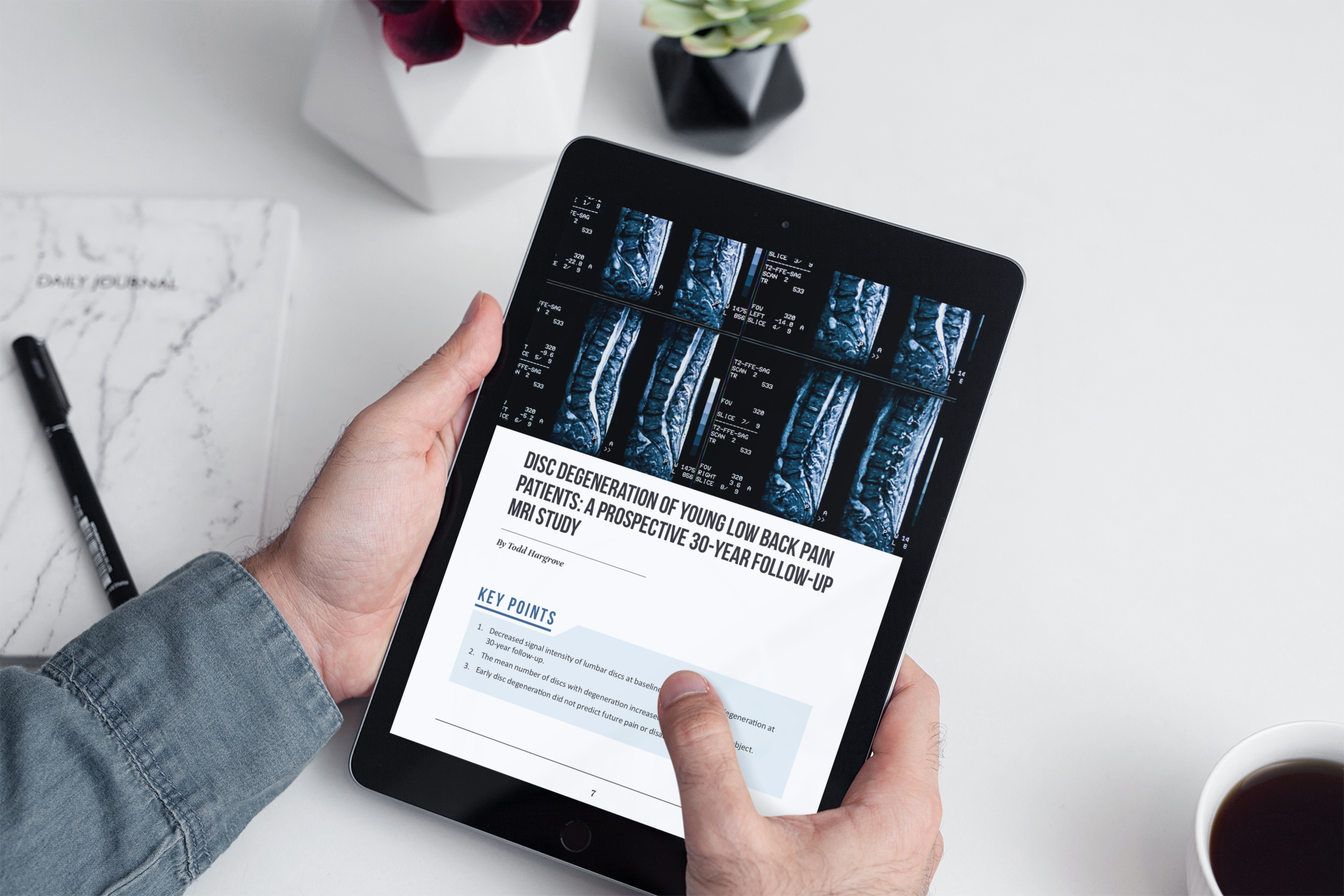A recent study sought to determine the extent to which degenerative disc changes in young low back pain patients predict progression of degenerative changes, disability, and pain 30 years later!
What you’ll read below is actually a snippet of our research review service, where we have experts break down the most recent research for you 💡
Key points from the study
- Decreased signal intensity of lumbar discs at baseline predicted severe degeneration at 30-year follow-up.
- The mean number of discs with degeneration increased from 0.9 to 3.5 per subject.
- Early disc degeneration did NOT predict future pain or disability.
Okay, let’s dive into it!
Background and Objective
MRI is an accurate method of measuring degenerative changes in intervertebral discs. The long-term consequences of such changes remain unclear however.
Methods/What They Did
In 1987, 75 low back pain patients aged 20 had lumbar spines MRIs. The subjects were all military recruits whose pain was severe enough to prevent service. 30 years later, 69 of these patients were contacted. Of these, 35 completed a pain and disability questionnaire, and 26 of these 35 received an MRI and clinical examination. MRIs were evaluated for decreased signal intensity and other degenerative changes.
Results/What They Found
Decreased signal intensity at baseline predicted severe degenerative change at follow up. For example, 57% of discs with decreased signal intensity at baseline had severely decreased signal intensity at follow-up, compared to 11% of healthy discs.
Importantly however, severity of disc degeneration at baseline was NOT associated with pain or disability at follow-up. The authors concluded that in young low back pain patients, early degeneration in lumbar discs predicts progressive degenerative change, but not pain or disability.
Limitations/Things to Keep in Mind
- Researchers did not have the MR images from the original study – only the values for signal intensity.
- The sample size was relatively small.
- Many subjects from the first study did not participate in the follow-up.
Clinical Implications
The long-term effects of early disc degeneration remain unclear. This study found that early disc degeneration in young low back pain patients was associated with severe changes after 30 years, but not pain or disability.
This study adds to a large and growing body of research showing that low back pain is complex, and that tissue damage is only one of many different factors that may contribute to pain. In fact, such damage may have little ability to predict the future course of events.
This study also presents encouraging evidence that 2/3 of a group of people with severe back pain in youth had only mild or no pain 30 years later. This information might benefit patients in reducing catastrophization, increasing optimism and self-efficacy, and informing decision-making about the need for potential surgery.
Do you want to save time by not having to wade through endless piles of studies?
Let us do the hard work for you!
Every month we summarise 12 of the most recent and clinically relevant studies in physio, for immediate application in the clinic.
Here’s the 11 other studies from our July issue just published:
- Bilateral Changes in Tendinopathy
- Effect of Massage on Performance + Recovery
- Hip Musculature in Greater Trochanteric Pain Syndrome
- Management of Thoracic Outlet Syndrome
- Psychologically Informed Practice in Physio
- Exercise Therapy for Axial Spondyloarthritis
- Rearfoot vs Forefoot Striking During Cutting
- Management of Pelvic Floor Dysfunction and LBP
- Is Inflammation Involved in Tendinopathy?
- Medication Use + Gait Mechanics in Older Adults
- Exercise-Induced Hypoalgesia



No comments:
Post a Comment